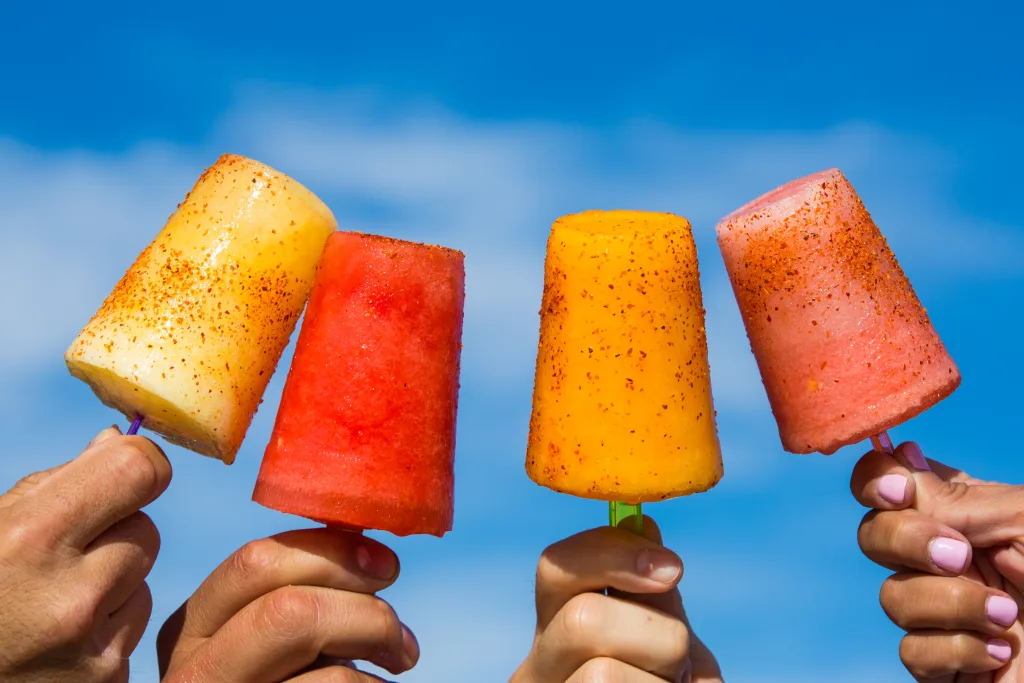Popsicles are a favorite summertime treat, but are they actually bad for you? The short answer is, it depends. While popsicles may be a low-calorie and tasty option, they can also be packed with added sugar and artificial ingredients. Here’s what to know about the health effects of eating popsicles.
Nutrition Facts
Most popsicles contain around 45 calories per serving, making them a relatively low-calorie snack option. However, their nutritional value varies depending on the type of popsicle you choose. Some popsicles contain added sugar and artificial ingredients that can increase their calorie and sugar content significantly. Additionally, most popsicles contain very few vitamins and minerals, so they aren’t a great source of essential nutrients.
Health Effects
Eating only popsicles is not healthy and won’t help you effectively lose weight. Popsicles may be a low-calorie choice, but they aren’t considered satiating calories since they don’t fill you up as an afternoon snack or meal replacement. Furthermore, many store-bought popsicles are filled with added sugars and artificial ingredients that can have negative health effects over time if eaten in large amounts.
Overall, tere isn’t much evidence to support that eating occasional popsicles is bad for your health or will cause weight gain. If you want to enjoy a healthier version of this summertime treat, try making your own homemade fruit or yogurt popsicles using fresh ingredients and no added sugar. This way, you can still enjoy the sweet treat without sacrificing your health in the process!
The Effects of Eating Popsicles Everyday
No, it is not recommended to eat popsicles every day. Eating too many popsicles can lead to an unhealthy diet. Popsicles are often high in added sugar and artificial flavors, making them a less nutritious choice than other foods. Additionally, a diet that consists mainly of popsicles would be low in essential vitamins, minerals and fiber needed for overall health. Eating popsicles occasionally as a treat can be part of a balanced diet, but they should not replace other nutritious foods such as fruits, vegetables, whole grains and lean proteins.

The Effects of Eating Popsicles on Weight Gain
Popsicles may not be the best snack choice if you’re trying to lose or manage your weight, as they are low in calories but not particularly satiating. Eating a Popsicle is unlikely to fill you up and could lead to snacking on more food before dinner. If you do choose to eat a Popsicle, try pairing it with some other snacks that are higher in protein and fiber, such as nuts or a piece of fruit, which will help you feel fuller for longer.
Are Popsicles a Healthier Alternative to Ice Cream?
Popsicles are generally considered to be healthier than ice cream. This is becuse they typically contain fewer calories and less fat than ice cream, as well as less sugar. For instance, a single serving of ice cream can contain up to 240 calories, while a popsicle can contain as little as 30 calories. Furthermore, while some ice creams may contain milk fat and other additives such as artificial sweeteners, most popsicles are made from fresh juice without added sugar. Additionally, many popsicles are fortified with vitamins and minerals that are beneficial for your health. Therefore, when considering the nutritional value of these two frozen treats, popsicles come out on top as the healthier option.
The Sugar Content of Popsicles
Popsicles are not particularly high in sugar. A standard, 3-ounce popsicle contains abut 45 calories and 9 grams of sugar. This is lower than the amount of sugar found in many other snack foods. Furthermore, the majority of that 9 grams of sugar comes from natural sources such as fruit juice, corn syrup, and/or cane juice concentrate. While 9 grams of sugar is still significant and should be considered when making dietary choices, it is much lower than the amount found in many other sugary treats.
The Craving for Popsicles
Craving popsicles may be a sign of pica, which is a condition where people have cravings for non-nutritive substances such as ice or paper. Pica cravings can include all kinds of frozen treats like ice cubes, snow cones and popsicles. While the exact cause of pica is not known, it has been linked to nutritional deficiencies such as iron deficiency and anemia. If you find yourslf craving popsicles frequently, it might be a good idea to speak to your doctor about it. A doctor can determine if any nutritional deficiencies are contributing to your cravings and suggest ways to help reduce them.

The Meaning Behind Craving Popsicles
Craving popsicles may indicate that you have a condition known as pagophagia. This is an urge to consume large amounts of ice, wich is typically associated with iron deficiency anemia. If the craving is ongoing and lasts for more than a month, it may be necessary to get evaluated by a doctor in order to confirm or rule out this diagnosis. Symptoms of pagophagia can include fatigue, paleness, shortness of breath, headaches, dizziness, and brittle nails. Other signs to look out for include difficulty concentrating and irritability. Treatment for pagophagia usually involves taking iron supplements in order to correct the underlying anemia.
The Health Effects of Eating Too Many Popsicles
No, it is not healthy to eat a lot of popsicles. Popsicles can contin large amounts of sugar and additives that can be detrimental to your health when consumed in excess. Eating too much sugar can lead to weight gain, cavities, and an increased risk of diabetes and heart disease. Additionally, some popsicles may contain artificial colors or flavors that can cause allergic reactions or digestive distress. Therefore, it is best to limit your intake of popsicles and opt for healthier alternatives such as frozen fruit or yogurt bars instead.
The Benefits of Eating Popsicles for Improved Well-Being
Popsicles make you feel better because they are an effective way to get fluids into your body, whch is essential when fighting a cold. Popsicles contain electrolytes, such as sodium and potassium, which help to keep your cells hydrated and energized. Additionally, the coldness of the popsicle can help numb a sore throat and reduce inflammation in the body. This can provide some relief from sore throat pain and other symptoms associated with a cold.
The Deliciousness of Popsicles
Popsicles are a great summer treat because they are tasty, convenient, and nutritious. They come in a variety of flavors, so there’s sure to be something that appeals to everyone. Plus, they’re small and come in single-serve sizes, wich makes portion control easy. Popsicles also provide an excellent source of vitamins and nutrients. Many varieties are made with real fruit juice or yogurt, giving them a healthy boost. Not only do they taste good but they can help you stay cool during hot days as well. All in all, popsicles are an ideal summer snack that can please everyone!

Do Popsicles Provide Hydration?
Yes, popsicles can help hydrate you. Water is the main ingredient in most popsicles, so eating them can help replace lost fluids. Additionally, some popsicles are made with ingredients that can provide additional hydration benefits. For example, adding electrolytes like potassium and magnesium to a popsicle mix can help replenish electrolytes lost from sweating. Also, many fruits are high in water content and adding them to your homemade popsicles ensures you’re getting even more hydration value from the treat. Finally, cold temperatures caue your body to lose less water than it does in warmer climates, so eating a frozen treat on a hot day may be an effective way to stay hydrated during the summer months.
Healthier Alternatives to Ice Cream
The healthiest alternative to ice cream is frozen yogurt. It contains significantly fewer calories and fat than regular ice cream, as it is made with low-fat or non-fat milk and yogurt cultures. Additionally, it’s usually lower in sugar and higher in protein. Frozen yogurt also contains probiotics, which are beneficial bacteria that help to support gut health. Other healthy options include sorbet, banana ice cream, smoothie bowls, chia pudding or coconut ice cream. All of these options contain fewer calories and fat than regular ice cream while still providing a delicious treat.
Do Popsicles Help Relieve Stomach Discomfort?
Popsicles can help make your stomach feel better if you are suffering from nausea, vomiting, and/or diarrhea. The cold temperature of the popsicle can help relieve discomfort in your stomach and the sugar content is gentle enough to not irritate your digestive system. Popsicles are a great way to restore lost fluids and electrolytes while also providing some energy. However, it is important to remember that popsicles should only be consumed in moderation if you are dealing with a stomach illness, as too much sugar or artificial flavorings miht worsen your condition.
Comparing the Sugar Content of Popsicles and Ice Cream
Ice cream generally has more sugar than popsicles. A 1/2 cup serving of vanilla ice cream typically contains arund 14g of sugar, while a single popsicle typically contains around 7g of sugar. That’s almost double the amount of sugar found in a popsicle. Additionally, some flavors of ice cream (like those containing chocolate or caramel) can contain even more sugar, so it’s important to read the labels carefully if you’re trying to watch your sugar intake.

Does a Popsicle Count as a Form of Nutrition?
Yes, a popsicle does count as food. Popsicles are made from fruit juice, sugar, and sometimes other ingredients like dairy or gelatin. They provide some essential nutrients like carbohydrates, protein, and vitamins. Additionally, they are a great source of hydration in hot weather and can be used to satisfy cravings for sweet treats without the added sugar found in many other desserts.
Are Sugar-Free Popsicles Safe to Consume?
No, sugar free popsicles are not a healthy choice. Even though they contain minimal or no added sugar, they typically replace the sugar with artificial sweeteners which can be unhealthy in large amounts. Artificial sweeteners have been linked to a variety of health issues such as headaches, digestive problems, and weight gain. Additionally, many of these frozen treats contain high levels of sodium and additives that can disrupt the body’s natural balance.
In order to make a healthier choice when it comes to frozen treats, try making popsicles at home with fresh fruit and natural sweeteners like honey or maple syrup. This will provide your body with essential vitamins and minerals while avoiding unhealthy additives.
Conclusion
In conclusion, it is important to be mindful of what you are eating and strive for a balanced, healthy diet. Eating only popsicles is not an effective way to lose weight and should not be relied on as a sole source of sustenance. However, when used in moderation as a substitute for high calorie and high fat desserts or snacks, popsicles can provide a low-calorie alternative that can help reduce overal calorie intake. Furthermore, popsicles may also contain lower amounts of sugar than ice cream when made from fresh juice without added sugar. Ultimately, the key is to make informed choices about what you eat and always strive for balance in your diet.
